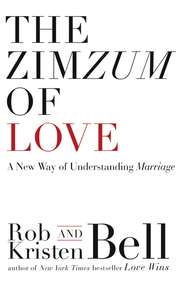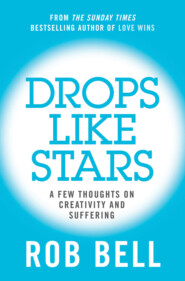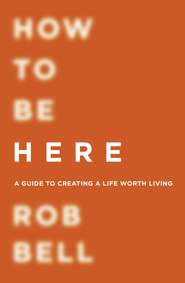По всем вопросам обращайтесь на: info@litportal.ru
(©) 2003-2024.
✖
The Complete Rob Bell: His Seven Bestselling Books, All in One Place
Автор
Год написания книги
2018
Настройки чтения
Размер шрифта
Высота строк
Поля
Jesus’s response? “You tell me, where did John get his?”13 (#ulink_c298c564-fcd3-5d35-a72b-cb4c0b8a2ef3)
Now imagine if a rabbi who had a new perspective on the Torah was coming to town. This rabbi who was making new interpretations of the Torah was said to have authority. The Hebrew word for “authority” is shmikah. This might not even happen in your lifetime. You would hike for miles to hear him.
A rabbi who taught with shmikah would say things like, “You have heard it said . . . , but I tell you. . . .”14 (#ulink_cf881fb2-e8ec-565f-8cc2-0d5a8ebd72df)
What he was saying is, “You have heard people interpret that verse this way, but I tell you that this is what God really means in that verse.”
Now the rabbis had technical terms for this endless process of forbidding and permitting and making interpretations. They called it “binding and loosing.” To “bind” something was to forbid it. To “loose” something was to allow it.15 (#ulink_8a147318-2867-54d9-a4aa-df8c518242ae)
So a rabbi would bind certain practices and loose other practices. And when he gave his disciples the authority to bind and loose, it was called “giving the keys of the kingdom.”
Notice what Jesus says in the book of Matthew: “I will give you the keys of the kingdom of heaven; whatever you bind on earth will be bound in heaven, and whatever you loose on earth will be loosed in heaven.”16 (#ulink_5d867410-a028-51de-b27a-38b208d1d541)
What he is doing here is significant. He is giving his followers the authority to make new interpretations of the Bible. He is giving them permission to say, “Hey, we think we missed it before on that verse, and we’ve recently come to the conclusion that this is what it actually means.”
And not only is he giving them authority, but he is saying that when they do debate and discuss and pray and wrestle and then make decisions about the Bible, somehow God in heaven will be involved.
Our Turn
Jesus expects his followers to be engaged in the endless process of deciding what it means to actually live the scriptures. And right away in the life of this new movement, we see them doing it. In Acts 15, these first Christians find themselves having to make a huge decision about what it means to be a Christian.
To understand what they are facing, we have to understand that they are Jewish—Jewish believers who are circumcised and eat kosher and recite Jewish prayers and celebrate Jewish feasts.
Jewish followers of a Jewish messiah who live a Jewish life in a Jewish nation.
But all sorts of Gentiles (people who aren’t Jewish) start becoming followers of Jesus. People who don’t eat kosher, who aren’t circumcised, who don’t dress and talk and look and live like them.
So what do they do? Do they expect all of these Gentiles to start being Jewish?
And what exactly would that mean? What would that look like? (Grown men being told that if they are really serious about becoming Christians, there’s a little surgery they need to have . . .)
The first Christians know that Jesus is for everybody, but what do they do with all of these Jewish laws they follow? So they convene a council (yeshiva in Hebrew) to discuss it.
After hearing all sides of the issue, they decide to forbid (or should we say they bind?) several things.17 (#ulink_cd550ba1-4d30-54f5-927c-587825fdf186)
Here is why this is so important: They have to make decisions about what it means to be a Christian.
They actually do it. They gather together and make interpretations of the Bible regarding what it will look like for millions of people to be Christians.
I wonder if one of them stood up at any point and said, “Jesus gave us the authority to do this, didn’t he?”
Now let’s move things into our world. If we take Jesus seriously and actually see it as our responsibility to bind and loose, the implications are endless, serious, and exhilarating.
The Bible is a communal book. It came from people writing in communities, and it was often written to communities. Remember that the printing press wasn’t invented until the 1400s. Prior to that, very few if any people had their own copies of the Bible. In Jesus’s day, an entire village could probably afford only one copy of the scriptures, if that. Reading the Bible alone was unheard of, if people could even read. For most of church history, people heard the Bible read aloud in a room full of people. You heard it, discussed it, studied it, argued about it, and made decisions about it as a group, a community. Most of the “yous” in the Bible are plural. Groups of people receiving these words. So if one person went off the deep end with an interpretation or opinion, the others were right there to keep that person in check. In a synagogue, most of the people knew the text by heart. When someone got up to teach or share insight, chances are everybody knew the text that person was talking on and already had their own opinions about it. You saw yourself and those around you as taking part in a huge discussion that has gone on for thousands of years.
Because God has spoken, and everything else is commentary.
Contrast this communal way of reading and discussing and learning with our Western, highly individualized culture. In many Christian settings, people are even encouraged to read the Bible alone, which is a new idea in church history. A great idea and a life-changing discipline, but a new idea. And think of pastors. Many pastors study alone all week, stand alone in front of the church and talk about the Bible, and then receive mail and phone calls from individuals who agree or don’t agree with what they said. This works for a lot of communities, but it isn’t the only way.
And it can’t be the only way if we take seriously Jesus’s call to be binding and loosing, which must be done in community. In fact, binding and loosing can only be done in community with others who are equally passionate about being true to the words of God.
In Jesus’s world, it was assumed that you had as much to learn from the discussion of the text as you did from the text itself. One person could never get too far in a twisted interpretation because the others were right there giving her insight and perspective she didn’t have on her own. Jesus said when he was talking about binding and loosing that “where two or three come together in my name, there am I with them.”18 (#ulink_6b7a61ae-c73c-5c3c-8b64-14eb64d50e40)
Community, community, community. Together, with others, wrestling and searching and engaging the Bible as a group of people hungry to know God in order to follow God.
Perhaps this is why the Bible can be confusing for some the first time they read it. I don’t think any of the writers of the Bible ever intended people to read their letters alone. I think they assumed that people who were hearing these words for the first time would be sitting next to someone who was further along on her spiritual journey, someone who was more in tune with what the writer was saying. If it didn’t make sense, you could stop the person who was reading and say, “Help me understand this.”
When we’re serious about dealing with the Bible as the communal book that it is, then we have to be honest about our interpretations. Everybody’s interpretation is essentially his or her own opinion. Nobody is objective.
Several years ago I was in an intense meeting with our church’s leaders in which we were discussing several passages in the Bible. One of the leaders was sharing her journey in trying to understand what the Bible teaches about the issue at hand and said something like this: “I’ve spent a great deal of time recently studying this issue. I’ve read what the people on the one side of the issue say, and I’ve read what the people on the other side say. I’ve read the scholars and the theologians and all sorts of others on this subject. But then, in the end, I decided to get back to the Bible and just take it for what it really says.”
What was she really saying?
Now please understand that this way of thinking is prevalent in a lot of Christian churches, so I don’t mean in any way to single her out. But this view of the Bible is warped and toxic, to say the least. The assumption is that there is a way to read the Bible that is agenda- and perspective-free. As if all these other people have their opinion and biases, but some are able to just read it for what it says.
Think about that for a moment: This perspective is claiming that a person can simply read the Bible and do what it says—unaffected by any outside influences.
But let’s be honest. When you hear people say they are just going to tell you what the Bible means, it is not true. They are telling you what they think it means. They are giving their opinions about the Bible. It sounds nice to say, “I’m not giving you my opinion; I’m just telling you what it means.”
The problem is, it is not true.
I’m actually giving you my opinion, my interpretation of what it says. And the more I insist that I am giving you the objective truth of what it really says, the less objective I am actually being.
Obviously we think our interpretations are the most correct; otherwise we’d change them.
Or as one of my favorite writers, Anne Lamott, put it, “Everybody thinks their opinion is the right one. If they didn’t, they’d get a new one.”19 (#ulink_e4121e6c-c54d-5c8a-9916-f91a5d945caf)
The idea that everybody else approaches the Bible with baggage and agendas and lenses and I don’t is the ultimate in arrogance. To think that I can just read the Bible without reading any of my own culture or background or issues into it and come out with a “pure” or “exact” meaning is not only untrue, but it leads to a very destructive reading of the Bible that robs it of its life and energy.
I have heard people say their church is growing because they “just teach the Bible.” As if other churches don’t. And what about the church that teaches the Bible and shrinks? The church that’s growing in numbers is probably growing for a lot of reasons, but the teaching-the-Bible reason is that they are teaching a particular understanding of the Bible. A yoke. They aren’t objective, and they aren’t just telling people what it says. They have interpreted it and made decisions about it, and this particular yoke they’re spreading resonates with people. This version—their version—is striking a chord with people, and so they are coming to hear more of this take on the Bible.
The Bible has to be interpreted. Decisions have to be made about what it means now, today.
The Bible is always coming through the interpretation of someone. And that’s because binding and loosing require awareness.
Awareness that everybody’s understanding of the Bible rests on somebody’s binding and loosing.
When was the last time you saw a Christian greet another Christian with a holy kiss? But it’s right there in the Bible. I can show you verses in Corinthians and Thessalonians and in one of Peter’s letters that say we should greet each other with a holy kiss.20 (#ulink_d6634137-680d-52b9-a62e-1ba4296cddf5)
Or how about women having to wear head coverings?21 (#ulink_8840f6bd-6a08-5c6f-9112-3640fb36f8a0)
Or cursing people who don’t love the Lord?22 (#ulink_9d468477-052c-5500-b132-708756b5f0c3)
Or selling all your possessions and giving everything to the poor?23 (#ulink_05a6405b-1f62-5abc-aebc-53fcb671f512)
Or men raising their hands when they pray?24 (#ulink_b2e395de-3fb0-5f93-8720-1861fa5d557b)
Or slaves having to obey their masters?25 (#ulink_938b1031-23c3-57ac-83e4-74336735adac)











